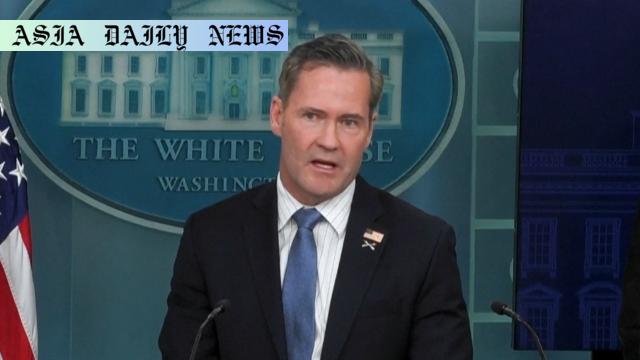Data Security: Waltz allegedly used Gmail for sensitive government-related communications and scheduled work documents.
Key Point 1: US NSA Mike Waltz reportedly used Gmail for government communications, as reported by The Washington Post.
Key Point 2: Sensitive topics, ranging from military systems to schedules, were communicated via a commercial, unsecured platform.
Key Point 3: NSC denies the use of personal email for sharing classified information but faces renewed criticism over data insecurity.

Introduction: Overview of the Issue
Recent revelations about US National Security Advisor Mike Waltz using his personal Gmail account for government communications have raised serious concerns about data security and the integrity of classified information. The Washington Post highlighted these allegations, pointing to the use of commercial platforms for sensitive discussions involving military conflict, weapons systems, and potentially exploitable work documents. This revelation sheds light on systemic challenges faced by government institutions in maintaining rigorous communication security standards.
Allegations and Key Revelations
According to reports, both Waltz and his staff used Gmail, a platform owned by Google, to communicate on various government operations. These communications allegedly included technical discussions with colleagues from other government entities. Such topics involved critical military information, ranging from troop positions to weapons systems crucial for ongoing conflicts. The report also revealed that Waltz received his schedule and certain non-classified work documents via the unsecured platform, raising alarms over potential cybersecurity exploits.
While the allegations do not confirm any exchange of classified documents over these channels, the very act of using a personal, unsecured email account for governmental interactions highlights glaring vulnerabilities. Critics believe this presents an easy target for adversaries intending to exploit crucial information.
Government Response and Previous Controversies
In response to these assertions, the spokesperson for the National Security Council (NSC) clarified that Waltz never used his personal email or insecure platforms to share classified material. However, the controversy mirrors prior instances of data breaches and points to inconsistent practices in digital communications across governmental branches. For example, reports emerged last month of Waltz reportedly using a Signal group chat comprising governmental officials to discuss military operations targeting Houthi rebels in Yemen. These incidents cumulatively fuel public skepticism about data security protocols implemented at the highest echelons of power.
Implications for National Data Security
The apparent lack of adherence to secure communication standards has sparked widespread criticism. The use of commercial platforms like Gmail for government endeavors could potentially expose critical information to unauthorized access from hackers, state-sponsored groups, or even surveillance by non-state actors. As digital espionage remains a critical threat in the 21st century, reliance on such platforms reflects inadequate preparedness against rapidly evolving cybersecurity challenges.
Furthermore, the issue underscores the necessity for better training and stricter internal protocols. With advanced cybersecurity now shaping national defense strategies worldwide, an over-reliance on commercial applications by government representatives undermines not only operational integrity but also public trust.
Moving Forward: Addressing Communication Security Gaps
To prevent similar occurrences, it is critical for government institutions to establish clear communication guidelines emphasizing the importance of secure channels in discussing sensitive matters. This entails not only investing in robust government-managed email infrastructure but also ensuring comprehensive training for public officials and their teams on data security protocols.
Ultimately, while technological solutions form the backbone of modern communication systems, it is human diligence and adherence to secure practices that determine their effectiveness. For agencies tasked with protecting national security, any lapses in following established protocols present risks that far outweigh convenience.



Commentary
Reflections on Government Communication Practices
The use of personal email accounts for government-related communication raises significant concerns about data security and operational integrity. In the 21st century, where cybersecurity threats are omnipresent, this practice is not only reckless but also indicative of wider systemic challenges within government institutions.
Data Security Risks in Political Leadership
One of the key takeaways from this situation is the complexity of balancing convenience with security in government operations. Commercial email or messaging platforms, while user-friendly, lack the robust layers of protection required to safeguard sensitive details from malicious actors. Leaders and their teams must recognize that their communication choices could inadvertently compromise national interests, resulting in severe geopolitical ramifications.
Enhancing Cybersecurity Standards
This incident sheds light on the importance of better education and training for government officials on the risks associated with cybersecurity. Standardized training modules, periodic refreshers on newly identified threats, and centralized monitoring systems could be instrumental in eliminating the kind of vulnerabilities seen here. It is imperative for government bodies to empower their leaders with tools and awareness that prioritize security over convenience.
Conclusion: A Call for Accountability
Ultimately, accountability will be the cornerstone of any meaningful reform in government data security practices. The unauthorized use of Gmail for sensitive discussions underscores not only individual lapses but also institutional blind spots that need urgent correction. By fostering a universal culture rooted in vigilance, responsibility, and consistency, governments can better safeguard sensitive information while meeting the evolving demands of cybersecurity in modern governance.